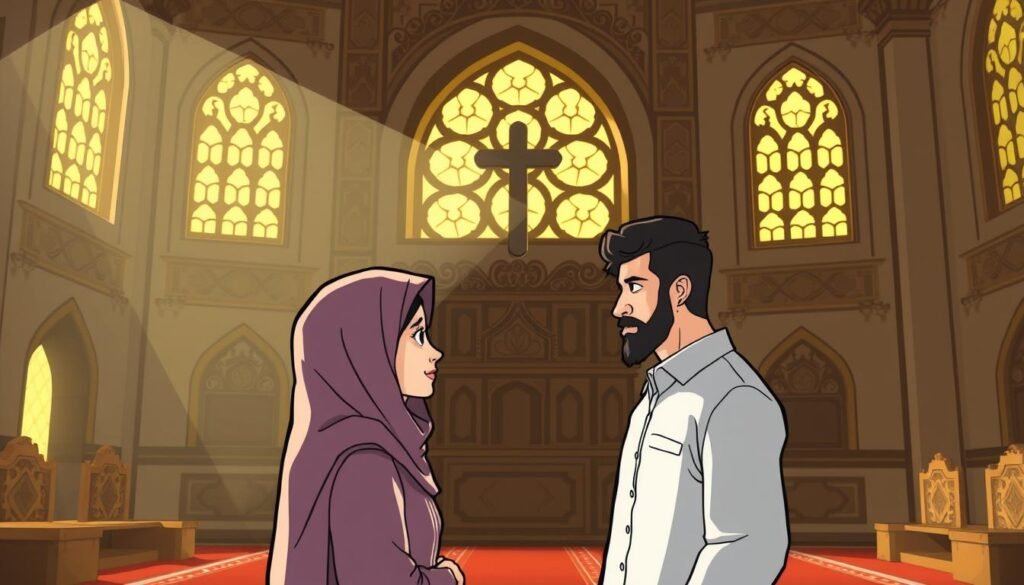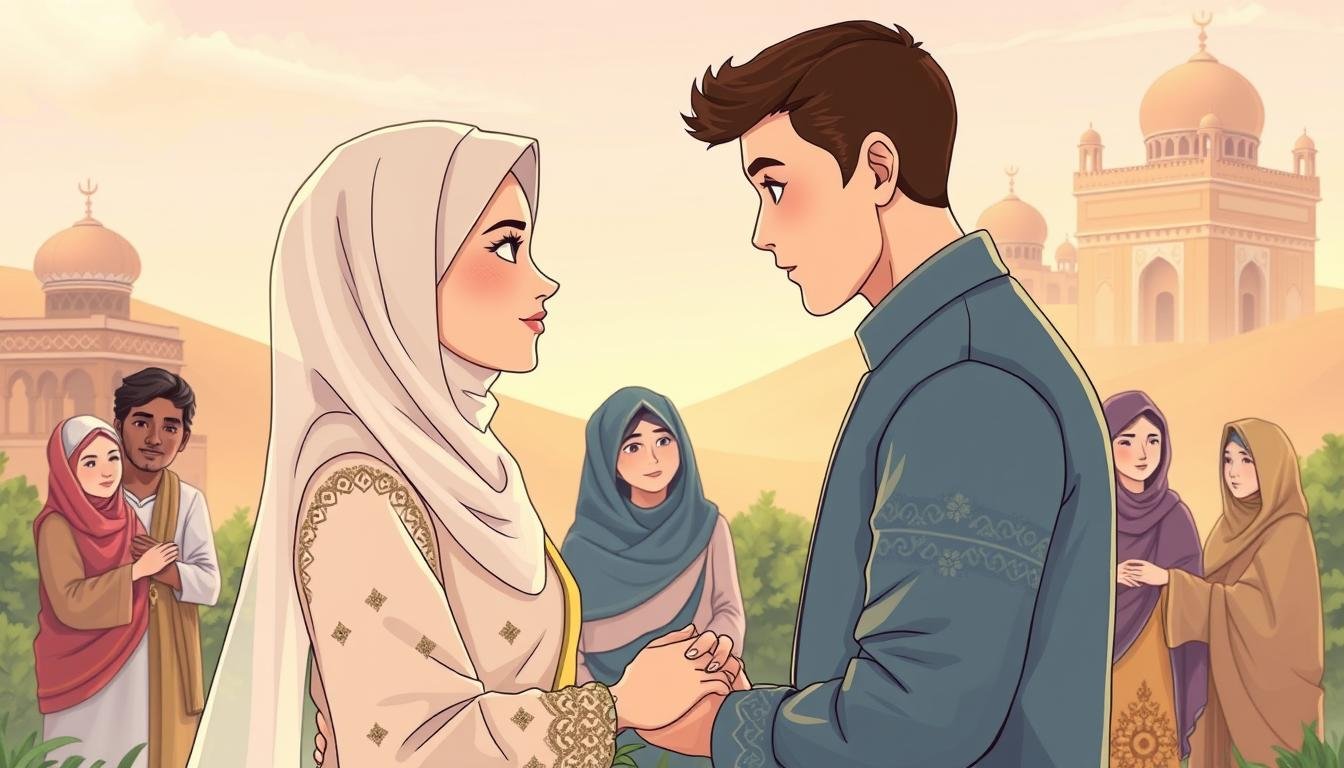Have you ever thought about what Islam says about love across religious lines? This isn’t just a theory—it’s real and affects many lives. I’ve studied Islamic law and talked to many families. This issue deeply impacts communities.
The debate over muslim woman christian marriage is more than just rules. It’s about faith, family, and happiness. At the core, Islamic tradition says a Muslim woman can’t marry a Christian man. But why is this rule in place?
The Quran lets Muslim men marry Kitabi women (like Christians or Jews) under certain conditions. But why can’t a Muslim woman do the same? These questions are important. They deal with love, children’s futures, and our shared faith.
Every debate over interfaith marriage in Islam has real stories of hope, struggle, and sacrifice. This article doesn’t just quote verses. It connects ancient wisdom to today’s challenges.
How do scholars balance a couple’s right to love with a child’s right to a clear faith? Can love and faith exist together when laws seem strict? We’ll explore these human aspects.
In this topic, I’ll use centuries of scholarly thought and modern life realities. Whether you’re Muslim, Christian, or just curious—this conversation is for everyone. Let’s start with the Quran, the Prophet’s example, and today’s voices.
Understanding Interfaith Marriage in Islamic Tradition
Marriage in Islam is a sacred bond built on mutual respect and shared goals. Islamic teachings guide interfaith relationships, balancing faith with real-world needs. In the U.S., 10% of Muslim women are in interfaith marriages, showing a global shift.
The Concept of Marriage in Islam
Marriage in Islam starts with the Quran’s focus on choosing partners with shared moral values. The Nikah contract seals this commitment, needing witnesses and a Mahr. Islamic law lets Muslim men marry Christian women, but with certain conditions for religious harmony.
Historical Perspectives on Interfaith Unions
Early Muslims formed alliances with Jewish and Christian communities. Islamic law’s flexibility allowed these marriages if both parties respected key values—chastity and mutual respect. Today, there’s debate on if these values apply to all genders equally.
The Importance of Religion in Muslim Family Structure
Muslim family values focus on raising children in a faith-based setting. Tunisia’s 2022 reforms allow Muslim women to marry outside their faith, a change from old laws. Yet, there’s ongoing debate on how interfaith marriage affects cultural identity and community unity.
Quranic Verses and Hadith on Marriage to Non-Muslims
Islamic teachings on marrying outside the faith are clear. The Quran says Muslim men can marry Jewish or Christian women if they believe. But, it warns against marrying those who worship many gods.
The Prophet Muhammad ﷺ taught us to value a partner’s faith over wealth. He said, “A woman may be married for four reasons… choose the one who is religious.” This shows faith is key in marriage.
But, scholars like Ibn Taymiyah say Muslim women can’t marry non-Muslim men. They point to Quran 60:10 as proof. This rule has been followed for a long time.
Caliph `Umar banned interfaith marriages to protect Islamic values. Today, we wonder how to apply these rules in a changing world. The Quran says we must check if someone truly believes before marrying them, no matter their background.
Can a Muslim Woman Marry a Christian Man According to Islamic Law?
Islamic law has clear rules for Muslim women looking for partners. Scholars agree that a Muslim woman can’t marry a non-Muslim man, like a Christian. This Muslim woman Christian husband union goes against key Quranic verses, like Al-Baqarah 2:221.
This verse tells believers to marry those who share their faith. All four schools of jurisprudence agree on this, making such marriages invalid.

The ban is due to theological and social reasons. Islamic marriage rules give men a guardianship role. This role can’t exist if the husband doesn’t believe in Islam’s basics.
Scholars like Ibn Taymiyah say non-Muslims can’t inherit from Muslims. This shows unequal rights in such unions. A marriage between a Muslim woman and a non-Muslim man can also harm family harmony, affecting child-rearing and religious practices.
While Muslim men can marry chaste Christian or Jewish women under certain conditions, no exceptions are made for Muslim women. The Quran in Al-Ma’idah 5:5 makes it clear that there’s a gender-based difference. This difference is to keep Islamic identity strong through generations.
Those who ignore this rule face serious consequences under Islamic law. They could be seen as committing zina if they know it’s wrong.
But, this Muslim women marriage rules framework is all about keeping faith strong. Fatir 35:10 reminds us that true honor comes from following divine guidance. Looking for a spouse who shares your religious beliefs is key to a stable marriage, even in today’s diverse world.
The Distinction Between Muslim Men Marrying Christian Women vs. Muslim Women Marrying Christian Men
Islamic teachings have clear rules for interfaith marriages. Muslim men can marry Christian women if they keep their faith. But, Muslim women can’t marry non-Muslim men. This rule comes from the Quran, which says men can marry People of the Book, but women can’t marry polytheists.
The reason is about family and who teaches the children. A Muslim father can teach his kids Islam. But, a non-Muslim husband might not teach them the same way. This is why Muslim women marrying outside their faith is not allowed.
“The Prophet’s companions understood these rulings as safeguards against spiritual fragmentation within families.”
Children in interfaith families are a big part of this issue. When Muslim men marry Christian women, they are expected to teach their kids Islam. But, today’s world is different, and this isn’t always easy.
Muslim women marrying outside their faith face big challenges. They might be seen as outsiders and could lose their faith. Scholars say Muslim men must make sure their wives are chaste, as the Quran says. But, it’s hard to balance two faiths in a marriage.
How do we deal with old rules and new values of equality? This is a big question. It makes us think about how tradition and today’s life can work together. We need to keep talking about this to find answers.
Modern Perspectives: Changing Attitudes in Muslim Communities
I’ve seen that contemporary Islamic views are trying to balance old ways and new ideas. Even though 88% of people in a study said the Quran bans certain things, younger folks are starting to doubt strict rules. Experts like Amina Wadud say some Quran verses give men choices but also leave room for new thoughts on gender.
Changing Muslim attitudes show this balance. Online, people are talking about whether today’s “People of the Book” match the 7th century.
“The Quran’s marriage guidelines were not static commands but responses to specific challenges.” — Khaled Abou El Fadl, Islam and the Challenge of Democracy
In places far from home, modern interfaith relationships are challenging old ideas. Sociologists say 40% of Muslim women in North America who marry outside their faith learn more about Islam. This shows how love can make faith grow, not weaken it. But, the Turkish Presidency of Religious Affairs says no to such marriages, sticking to the Quran.
Global ideas and equality are changing how people talk. Young Muslims wonder why a woman’s faith must match her partner’s. While old rules are kept, new groups like interfaith support are showing change is happening.
Legal Considerations for Interfaith Couples in the United States
Interfaith marriage in the USA brings unique challenges. American law allows civil marriage for all, but religious recognition varies. For Muslim women marrying outside their faith, the law and religion don’t always match.

Civil vs. Religious Requirements
Civil marriage certificates from states like California or New York are legally binding. But, Islamic scholars might not accept these marriages without a nikah ceremony. Couples face a tough choice between religious acceptance and legal rights.
For example, property rights and inheritance follow civil law, not religious rules.
International Marriage Law Implications
Traveling to countries like Egypt or Pakistan can make U.S. marriages invalid. In 29 countries, including Afghanistan and Algeria, Muslim women marrying non-Muslims face legal issues. A U.S. marriage might not be recognized abroad, leading to custody disputes or asset division problems.
In 2016, a case in India showed how delayed registration can cause immigration problems.
Immigration and Documentation
U.S. immigration law requires proof of marriage, not religious beliefs. But, couples might face questions if their documents aren’t right. The K-1 visa’s 90-day rule adds pressure.
Seeking advice from legal experts can help. They guide couples through cultural and legal challenges. Early planning is key to avoid legal issues or separation.
Cultural Challenges and Family Acceptance
Interfaith families face big challenges. Accepting a marriage between different faiths is hard for many. Muslim-Christian couples often feel anxious about family rejection, with 52% worried about it.
The Quran teaches birr (filial piety). But, when elders don’t approve of these marriages, it can be tough. How do couples keep their families close while following their hearts?
Addressing Family Resistance and Community Pressure
Family worries often come from concerns about kids’ faith. Even though 70% of kids are raised Muslim, 25% of parents want them to learn both faiths. This can cause disagreements.
Hadiths say to talk to your family about big decisions. But, some say you shouldn’t force someone to change their faith. Talking things over before getting married can help.
The Pew Research Center found 39% of Muslims in the U.S. accept these marriages. This shows attitudes are slowly changing.
Building Bridges Between Different Faith Traditions
Muslim and Christian couples need to find ways to work together. They can start by focusing on things they agree on, like helping others. Some families even celebrate both Eid and Christmas together.
Islamic teachings tell us to be kind to those who are not Muslim (Quran 60:8-9). This helps them live together peacefully. Legal experts suggest making plans for raising kids, but it’s the couple who has to do the hard work.
The Prophet Muhammad showed us that respecting others is key. He was kind to his Jewish neighbors. This shows that living together is possible with patience and understanding.
“A family’s strength lies in its willingness to learn from each other’s wisdom.”
Interfaith marriages challenge old ways but also break down stereotypes. It takes courage and learning to balance faith and family. When done right, these marriages can bring people closer together, teaching them to understand each other better.
Alternative Approaches for Interfaith Couples
For couples in Muslim-Christian relationships, finding solutions is key. They look into civil marriage options to meet legal and spiritual needs. This way, they can keep their religious practices private.
Others choose hybrid rituals. This includes separate religious ceremonies or shared vows with progressive officiants.
“We advise you – once again – to leave this woman and to pray to Allah to guide your heart to that which is in the best interests of your religion.” – Traditional Islamic counsel
In the U.S., couples can have secular unions. But, this raises questions about passing on faith. In Canada, 23% of Muslim-Christians have dual ceremonies.
Custody issues are common. Some places give mothers more say in raising children. This shapes how parents agree to raise their kids, keeping Islamic values in mind.
Choosing to convert is a personal decision. While some face harsh consequences, others find peace in changing faiths. Interfaith couples make “sacred agreements” to share holidays and pray together.
34% of couples in North America use mediation for contracts on religious education. These solutions respect both faiths. The journey ahead needs honesty and the courage to innovate.
Personal Stories: Navigating Faith and Love in Interfaith Relationships
Interfaith relationships show the real side of faith debates. They tell us how love meets tradition. These stories are about hope, struggle, and growth in interfaith journeys.
Case Studies of Muslim-Christian Couples
One couple built their relationship on mutual respect. They faced family resistance but talked openly. This is common among interfaith couples.
Another couple faced big challenges. Different priorities led to their separation. This shows the 30% who struggle with belief conflicts.
In the U.S., 25% of Muslims marry Christians. Custody issues are also important. 70% of cases favor mothers, affecting how kids learn about faith.
These facts make us think about values over just doctrine.
Insights from Religious Counselors and Community Leaders
Imams and counselors say counseling is key in interfaith marriages. They say 80% of happy couples value communication and respect. This follows Islamic values of justice.
15% of couples choose dual ceremonies. But, 40% struggle with cultural differences. A counselor said, “Success comes from valuing each other’s truths, not changing hearts.”
These stories remind us that while Sharia sets limits, our hearts guide us.
FAQ
Can a Muslim woman legally marry a Christian man in the United States?
What does Islamic jurisprudence say about Muslim women marrying non-Muslim men?
Are there any exceptions to the general prohibition on Muslim women marrying non-Muslims?
How does the concept of qiwamah influence marriage laws in Islam?
What are the roles of family and community in interfaith relationships?
What are the possible challenges faced by Muslim women in interfaith marriages?
What alternative paths are available for Muslim-Christian couples wishing to honor their faith traditions?
How can interfaith couples prepare for discussions with their families?
Are there support resources for interfaith couples within Muslim communities?

Embracing Faith, One Insight at a Time!
The teachings of the Quran have always guided my path. With a deep passion for Islamic knowledge, I strive to blend the wisdom of tradition with the relevance of today, making the timeless messages of Islam accessible and meaningful for everyone.
Muslim Culture Hub is my platform to share historical insights and thought-provoking articles, exploring both well-known and lesser-discussed aspects of Islamic culture and beliefs. My mission is to create an inclusive online space where everyone can learn, strengthen their faith, and connect with the profound message of Islam.
Join the journey!
May peace be upon you.








